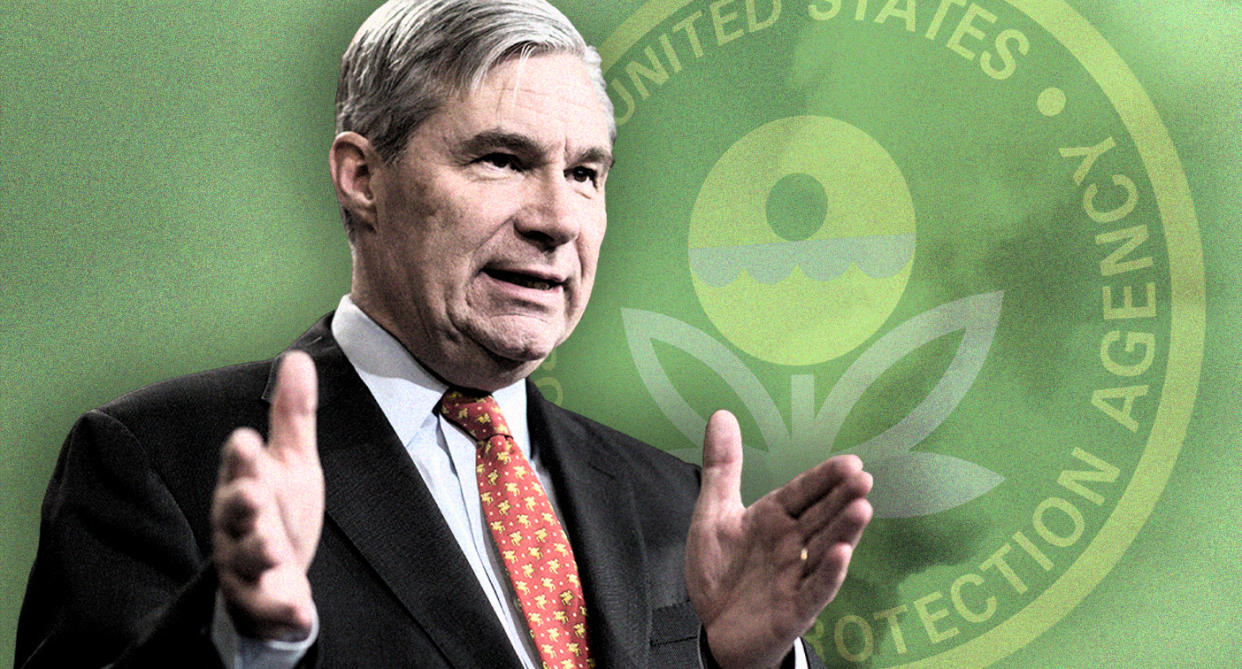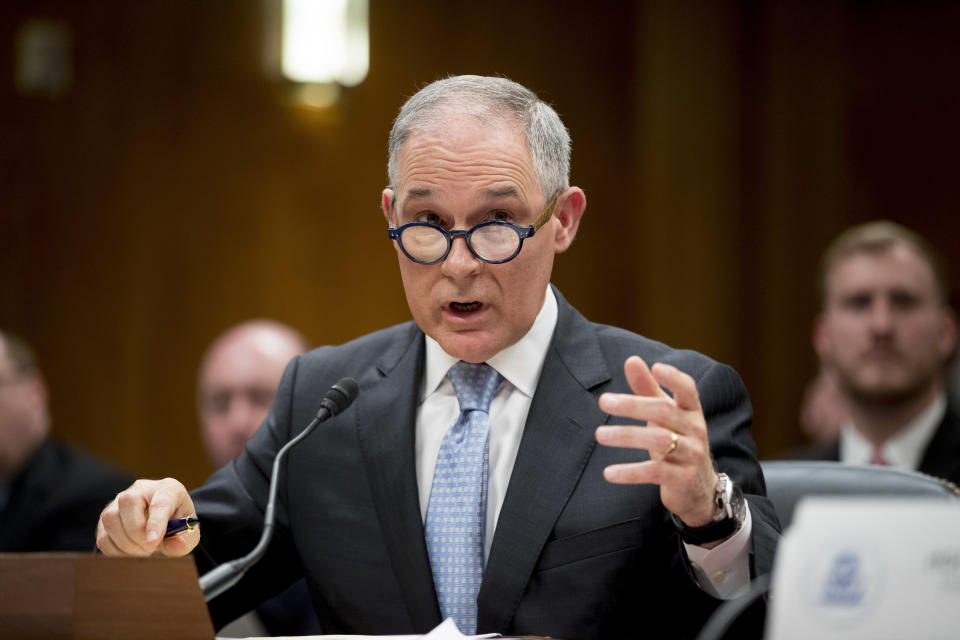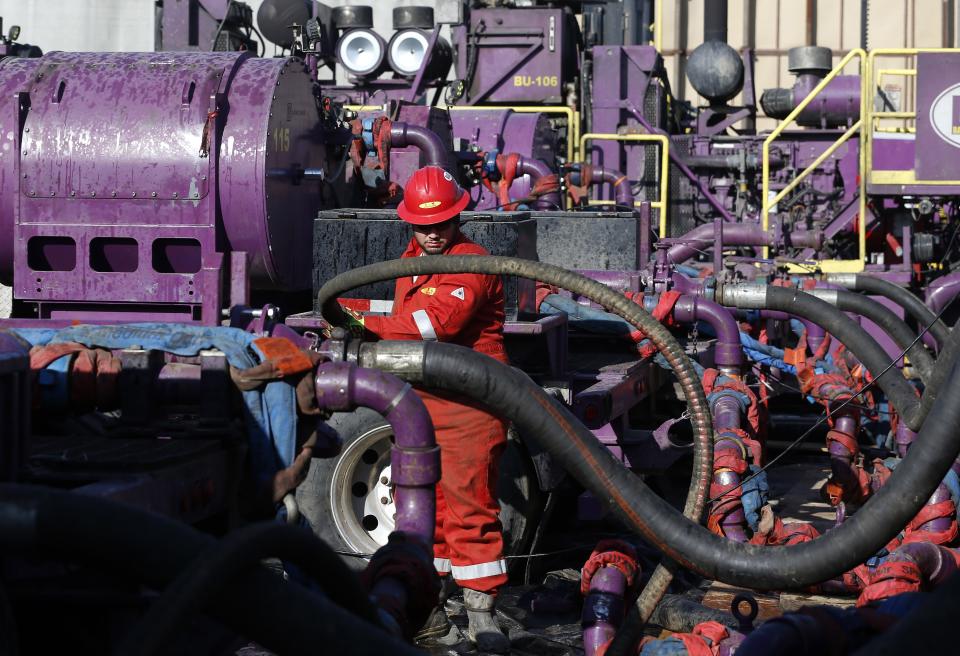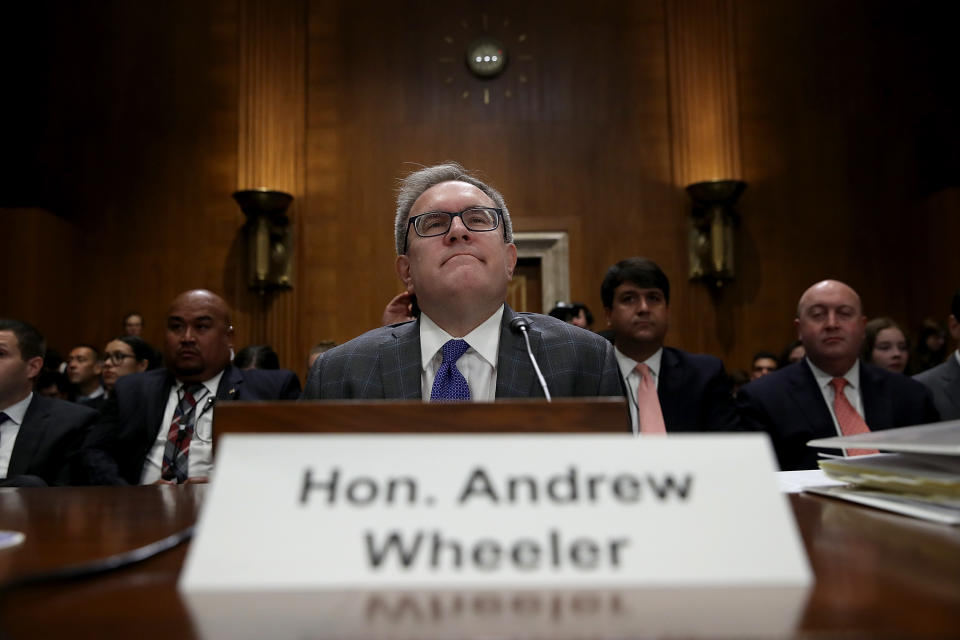Senators fight EPA effort to weaken controls on methane pollution

Sen. Sheldon Whitehouse, D-R.I., is trying to derail a proposed Trump administration rule that would weaken restrictions on methane pollution, with the argument that former EPA Administrator Scott Pruitt’s conflicts of interest stemming from his ties to the fossil fuel industry make the proposal invalid.
“This proposal runs headlong into serious legal and ethical roadblocks. As Oklahoma attorney general, Scott Pruitt repeatedly challenged the EPA’s efforts to regulate methane emissions, meaning he’d clearly made up his mind about the issue,” Whitehouse told Yahoo News on Wednesday.
Whitehouse said that the two key officials who have been pushing for the proposal since Pruitt’s resignation in July — acting EPA Administrator Andrew Wheeler, a former coal industry lobbyist, and Neomi Rao, administrator of the Office of Information and Regulatory Affairs — also have ties to the oil and gas industry that should render the proposal invalid. Rao founded a conservative think tank at George Mason University’s law school (now named after the late Justice Antonin Scalia) in part with a multimillion-dollar gift from the foundation run by energy-industry magnate Charles Koch.
Whitehouse, a member of the Senate’s Environment and Public Works Committee, denounced “the wholesale capture of the Trump administration by the fossil fuel industry, including the cadre of politicos — like Wheeler and Rao — with deep ties to the industry and its front groups. They allow oil and gas companies to tear down any environmental protection they find inconvenient — just like they’re trying to do here. Under these conditions, the proposed rule cannot stand.”
Whitehouse, joined by Sens. Chris Van Hollen, D-Md., Jeff Merkley, D-Ore., Cory Booker, D-N.J., Kirsten Gillibrand, D-N.Y., and Edward Markey, D-Mass., submitted an official comment to the agency on Monday, the final day of the open-comment period. They argued that Pruitt, who had been Oklahoma’s attorney general, continued his pattern of taking official actions to help his oil and gas industry donors after he was confirmed as EPA administrator.

“This was particularly true with respect to methane regulations, where the relationships Pruitt established through his political activities as Attorney General continued to pay off for his oil and gas industry donors once he became EPA Administrator,” the Democratic senators wrote.
As the attorney general of Oklahoma, Pruitt sued the EPA 14 times, and one of these lawsuits challenged the very 2016 methane rules that his proposal seeks to undo. The D.C. Circuit put this litigation in abeyance at the request of state petitioners after Pruitt announced the EPA would revisit the rules. The Obama-era policy requires repairing methane leaks from oil and gas wells during drilling at new or modified oil and natural gas facilities. According to Trump’s EPA, this unnecessarily burdened domestic energy producers with regulatory costs.
Methane — better known as natural gas — is a potent greenhouse gas that accelerates global warming, especially in the short term. Methane traps more heat than carbon dioxide but doesn’t linger in the atmosphere for as long, so scientists say reducing these emissions would have a relatively fast and significant impact on climate change. Methane, which can enter the atmosphere from leaks in pipelines or oil and gas wells, currently accounts for roughly 10 percent of greenhouse gas emissions in the U.S.
The Democratic senators contend that the proposal to rescind the rule is illegal for four reasons: 1) It is “irreparably tainted” due to Pruitt’s “inalterably closed mind,” 2) Pruitt’s participation violated the Ethics in Government Act’s impartiality requirement, 3) it is arbitrary and capricious and not the result of “reasoned decision-making,” and 4) it delegates regulatory authority to the oil and gas industry’s private interests.
The 1980 U.S. Court of Appeals decision in Association of National Advertisers, Inc. v. Federal Trade Commission held that the public has the right to “a fair and open proceeding,” which includes “access to an impartial decisionmaker.” The case also established that a regulator should be disqualified if it’s clearly demonstrated that he has an “unalterably closed mind on matters critical to the disposition of the proceeding.”

The senators invoked Part 2635 of the Code of Federal Regulations, which requires impartiality on the part of government officials, saying “no reasonable person” would conclude that Pruitt would approach the process with “any degree of impartiality” given his previous efforts against the Obama-era rule.
The Administrative Procedure Act states that courts can dismiss agency actions if they are determined to be “arbitrary, capricious, an abuse of discretion, or otherwise not in accordance with the law.” In FCC v. Fox Television Stations, Inc., the Supreme Court established that an “agency cannot simply disregard contrary or inconvenient factual determinations that it made in the past.” The senators argue that Pruitt’s rule is “arbitrary” and “capricious” because it does not attempt to refute — or even engage with — the Obama era rule’s discussion about methane’s role in climate change.
The Department of Transportation v. Association of American Railroads makes it clear that Congress “cannot delegate regulatory authority to a private entity.”
Although he resigned amid scandal, Pruitt is central to their argument because he oversaw the creation of the proposal and its April submission to the Office of Information and Regulatory Affairs for review, which was completed Sept. 9. Under Wheeler, who has continued his predecessor’s policies, the EPA announced the proposal on Sept. 11.
Madeleine Foote, a legislative representative for the League of Conservation Voters, said the Obama-era rule would cover only new and modified sources in the oil and gas industry and require more common-sense solutions to reduce methane pollution, such as requirements for leak detection and repairs.

“Because of Pruitt’s close ties to the industries, we feel — as the senators do too — that all of the decisions he made on rules like this should be revisited and postponed,” Foote told Yahoo News. “It was pretty one-sided. There was not outreach to stakeholders besides the industry. We know that some states like Colorado have already put in requirements for what was already on the books.”
The senators’ official comments will go into the public docket alongside many others, but considering their provenance they carry more weight. Foote said she hopes the EPA will take heed of these concerns but worries the comments will fall on deaf ears — considering the Trump administration’s trajectory so far.
“This is only step one of EPA’s efforts to roll back their methane regulations,” Foote said. “We anticipate another proposal sometime next year.”
Some of the opposition has even come from the fossil fuel industry itself. Reuters reported that Exxon Mobil sent a letter urging the EPA to uphold the methane gas emission rules, saying the company believes in “reasonable regulations [to] help reduce emissions.”
The Natural Resources Defense Council joined several other environmentalist organizations in filing similar, highly detailed comments with the EPA earlier this week.
David Doniger, the senior strategic director of NRDC’s climate and clean energy program, told Yahoo News it is unconscionable for the Trump administration to propose weakening limits on “cancer-causing, smog-forming, climate-warming pollution.” Oil and gas operations release pollution that can form smog. Air pollution increases the risk of lung cancer.
“Doing so will mean more pollution in the communities already suffering the most from the harmful effects of oil and gas development in their backyards,” Doniger continued. “And it means more climate pollution at a time when the effects of climate change across the country — from floods to hurricanes, heat and wildfires — are only becoming clearer.”
An American Lung Association poll conducted shortly after the Obama-era rules were finalized found that Americans overwhelmingly support standards to reduce methane emissions across nearly all demographics.
_____
Read more from Yahoo News:


